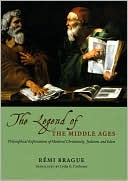List Books » The Legend of the Middle Ages: Philosophical Explorations of Medieval Christianity, Judaism, and Islam
Category Books
- Fiction Books & Literature
- Graphic Novels
- Horror
- Mystery & Crime
- Poetry
- Romance Books
- Science Fiction & Fantasy
- Thrillers
- Westerns
- Ages 0-2
- Ages 3-5
- Ages 6-8
- Ages 9-12
- Teens
- Children's Books
- African Americans
- Antiques & Collectibles
- Art, Architecture & Photography
- Bibles & Bible Studies
- Biography
- Business Books
- Christianity
- Computer Books & Technology Books
- Cookbooks, Food & Wine
- Crafts & Hobbies Books
- Education & Teaching
- Engineering
- Entertainment
- Foreign Languages
- Game Books
- Gay & Lesbian
- Health Books, Diet & Fitness Books
- History
- Home & Garden
- Humor Books
- Judaism & Judaica
- Law
- Medical Books
- New Age & Spirituality
- Nonfiction
- Parenting & Family
- Pets
- Philosophy
- Political Books & Current Events Books
- Psychology & Psychotherapy
- Reference
- Religion Books
- Science & Nature
- Self Improvement
- Sex & Relationships
- Social Sciences
- Sports & Adventure
- Study Guides & Test Prep
- Travel
- True Crime
- Weddings
- Women's Studies
The Legend of the Middle Ages: Philosophical Explorations of Medieval Christianity, Judaism, and Islam »

Authors: Remi Brague, Lydia G. Cochrane
ISBN-13: 9780226070803, ISBN-10: 0226070808
Format: Hardcover
Publisher: University of Chicago Press
Date Published: April 2009
Edition: (Non-applicable)
Author Biography: Remi Brague
Rémi Brague is professor of philosophy at the Université Paris I Panthéon-Sorbonne and at the University of Munich. He is the author of nine other books, including The Law of God and The Wisdom of the World, both published by the University of Chicago Press. Lydia G. Cochrane has translated numerous books for the University of Chicago Press.
Book Synopsis
Modern interpreters have variously cast the Middle Ages as a benighted past from which the West had to evolve and, more recently, as the model for a potential future of intercultural dialogue and tolerance. The Legend of the Middle Ages cuts through such oversimplifications to reconstruct a complicated and philosophically rich period that remains deeply relevant to the contemporary world.
Featuring a penetrating interview and sixteen essays—only three of which have previously appeared in English—this volume explores key intersections of medieval religion and philosophy. With characteristic erudition and insight, Rémi Brague focuses less on individual Christian, Jewish, and Muslim thinkers than on their relationships with one another. Their disparate philosophical worlds, Brague shows, were grounded in different models of revelation that engendered divergent interpretations of the ancient Greek sources they held in common. So, despite striking similarities in their solutions for the philosophical problems they all faced, intellectuals in each theological tradition often viewed the others’ ideas with skepticism, if not disdain.
Such divisions, Brague contends, debunk notions that the medieval Mediterranean world was a European or Islamic cultural center in which different groups of people harmoniously mingled. His clear-eyed and revelatory portrayal of this misunderstood age brings to life not only its philosophical and theological nuances, but also its true lessons for our own time.
Choice
"All of the essays offer fascinating insights into all manner of topics of interest to medieval thinkers. . . . Brague shows not only an encyclopedic and detailed grasp of his sources, but also a penchant for tying these to contemporary interests in intriguing, creative ways. . . . This truly is an informative, engaging, and very readable book that will be very useful to anyone with an intellectual interest in things medieval."
Table of Contents
Interview 1
Pt. I Generalities
1 The Lessons of the Middle Ages 25
2 The Meaning and Value of Philosophy in the Three Medieval Cultures 41
3 Just How Is Islamic Philosophy Islamic? 57
Pt. II Common Themes
4 Is Physics Interesting? Some Responses from Late Antiquity and the Middle Ages 73
5 The Flesh: A Medieval Model of Subjectivity 91
6 The Denial of Humanity: On the Judgment Those People Are Not Men in Some Ancient and Medieval Texts 107
Pt. III Comparisons
7 Three Muslim Views of the Christian City 121
8 The Jihad of the Philosophers 131
Pt. IV Filiations
9 Inclusion and Digestion: Two Models of Cultural Appropriation, in Response to a Question of Hans-George Gadamer (Tubingen, September 3, 1996) 145
10 The Interpreter: Reflections on Arabic Translations 159
11 The Entry of Aristotle in Europe: The Arab Intermediary 169
12 The Extra-European Sources of Philosophic Europe 175
Pt. V Pricked Balloons
13 Some Mediterranean Myths 185
14 Was There Any Dialogue between Religions in the Middle Ages? 193
15 Geocentrism as the Humiliation of Man 203
16 Was Averroes a "Good Guy"? 221
App Original Texts 231
Notes 235
Index 279
Subjects
 Philosophy
Philosophy  Ancient & Medieval Philosophy
Ancient & Medieval PhilosophyNonfiction
 Philosophy
Philosophy  General & Miscellaneous Philosophy
General & Miscellaneous PhilosophyNonfiction
 Philosophy
Philosophy  Major Branches of Philosophical Study
Major Branches of Philosophical StudyNonfiction
 All Nonfiction
All Nonfiction  Ancient & Medieval Philosophy
Ancient & Medieval PhilosophyPhilosophy
 Ancient & Medieval Philosophy
Ancient & Medieval Philosophy  Medieval Philosophy
Medieval PhilosophyPhilosophy
 General & Miscellaneous Philosophy
General & Miscellaneous Philosophy  History of Philosophy
History of PhilosophyPhilosophy
 Major Branches of Philosophical Study
Major Branches of Philosophical Study  Religion, Philosophy of
Religion, Philosophy of
